In this article
Overview
If you have seen a demonstration or have worked with Decision Lens several years ago you know it excelled at collaborative prioritization. Since then, the solution has evolved significantly to address the public sector’s need for continuous planning . In March of 2020, Decision Lens launched an all-new platform, providing an end-to-end, cloud-based, light-weight yet comprehensive capability for requirements planning and budget planning that spans PPBE, RAP, and program planning including sustainment and modernization.
The goal was to rapidly automate the requirements planning and budgeting process.
Today, Decision Lens includes coverage starting with basic data management and intake through more advanced resource allocation, scenario planning, and performance-based outcomes. There is workflow with permission-based access so that an entire organization can be instrumented with this, providing newfound visibility for senior leadership.
The primary use case is financial management including PPBE, UFRs and Requirements Planning, POM, and Budget Formulation and Execution. Time-to-value with this solution is extremely fast (on the order of weeks). Since the launch, we have seen over 1000% growth in usage as Federal organizations using spreadsheet and email-based planning processes rapidly migrate to this cloud-based analytics capability to not only prioritize and allocate, but to manage data in the new data studio that provides workflow and forms for intake and project status amongst many other capabilities.
This blog series will focus on the software, process, and algorithms enabling senior-level financial management leaders to gain visibility from strategy to resourcing, and to quickly address disruptors, with the ability to use advanced algorithms to shift priorities and resources “on-the-fly” as situational awareness develops and drive much greater efficiency and accountability.
We believe that Decision Lens represents the future of analytical planning.
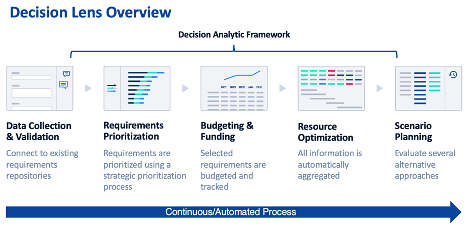
A Modern Planning Workflow
Automated Intake
Did you know that Decision Lens has an intakeengine allowing portfolio owners to create custom forms to collect data with workflows to gather, validate, and approve incoming resource requests to be considered for prioritization? This idea engine enables efficiency through process simplification as well as eliminating all the error prone and version control types of issues plaguing organizations. Ultimately, it enables the lightning-fast achievement of a comprehensive, continuously updated list of projects to support their decisions.
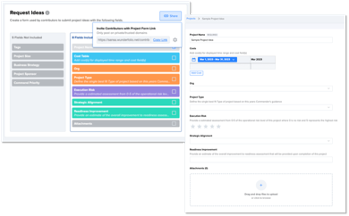
Scoring and Prioritization
Did you know that Decision Lens has multiple scoring and prioritization methods beyond the staple collaborative, high fidelity process known as the Analytic Hierarchy Process (AHP)…? Prioritization is not a one-size fits all approach. The options resident in our software are flexible, scalable, and can easily adapt to both current and future needs to achieve desired outcomes, from rapid star-based scoring to a more comprehensive multi-criteria approach.
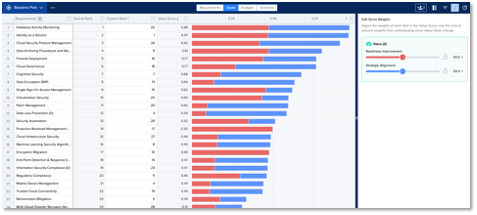
Algorithm Powered Scenario Planning
Did you know that Decision Lens uses newly developed patented algorithms in our Strategy Navigator to look at millions and millions of combinations of funding choices to suggest portfolio plans that maximize across Value/Cost/Risk/Balance and provide actionable AI driven recommendations? Scenario planning is critical for enabling organizations the ability to account for their uncertainties and quickly see how a range of circumstances could impact their mission.
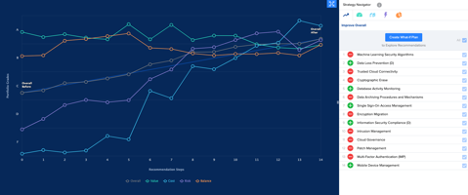
Bottleneck Analysis
Did you know that Decision Lens has a bottleneck analysis engine using advanced algorithms to solve complex portfolio resource constraints and project timing problems? Our bottleneck analysis capabilities use technology to solve problems that individuals simply cannot solve to offer suggestions for project scheduling to stay within budget availability levels while maximizing portfolio value in the near-term. Bottleneck analysis will assist in quickly identifying where available resources do not meet the demands of your current schedule. It will then provide the necessary changes, while accounting for multiple factors such as colors of money, requested timeframes, and interdependencies between projects, and guides how to stay within the resource envelope available ($ and people too!) all while maximizing your performance objectives.
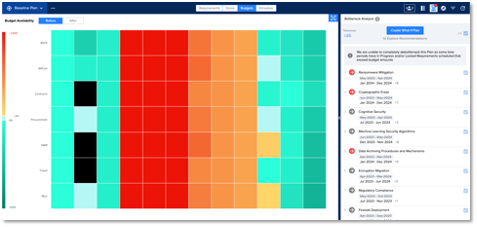
Spend Plan Tracking
Did you know Decision Lens has Spend Plan tracking capabilities to support financial management processes from prioritization through execution? Organizations understand money moving is money at risk. Therefore, it is paramount to quickly see where execution against obligation rates is off-plan and make the necessary changes to get back on track.
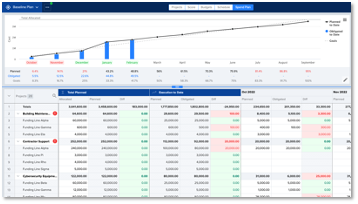
Decision Lens is seeing tremendous uptake across DoD, the Intelligence Community, and Civilian agencies who have realized that their back-office use of manual spreadsheets and email is the weak link in the chain for them to achieve their missions and to use advanced analytical planning that is available today to be ready for whatever challenges they face.





